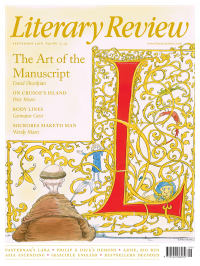Edward Chaney
Migrating Monoliths
Cleopatra’s Needles: The Lost Obelisks of Egypt
By Bob Brier
Bloomsbury 238pp £19.99
This book’s title suggests an admirable aspiration to present a fascinating subject in both a scholarly and an accessible style. Bob Brier is billed as ‘a world-famous Egyptologist’. His books include The Murder of Tutankhamen and Ancient Egyptian Magic, and he has hosted television programmes on ancient Egypt. Unmentioned in the author’s biography is his Egyptomania: Our Three Thousand Year Obsession with the Land of the Pharaohs, published in 2013. Cleopatra’s Needles reprises and enlarges those chapters of Egyptomania that deal with the removal of Egyptian obelisks to Rome, Paris, London and New York (it adds Constantinople and might also have added Kingston Lacy in Dorset, where in 1840 William Bankes installed the toppled obelisk he had found at the Temple of Isis at Philae). Both Brier’s books are indebted to Erik Iversen’s authoritative two-volume Obelisks in Exile (1968–72), as well as Obelisk: A History, a comprehensive collection of essays published in 2009. He might also have cited Aubrey Noakes’s Cleopatra’s Needles, published prior to these in 1962.
Brier’s didactic tone, doubtless derived from many an illustrated talk, is established in his first chapter, ‘How to Quarry an Obelisk’. Its centrepiece is an informative account of the ‘unfinished obelisk’ in Aswan in Upper Egypt. We are informed that ‘Egypt is a desert with a river running

Sign Up to our newsletter
Receive free articles, highlights from the archive, news, details of prizes, and much more.@Lit_Review
Follow Literary Review on Twitter
Twitter Feed
Under its longest-serving editor, Graydon Carter, Vanity Fair was that rare thing – a New York society magazine that published serious journalism.
@PeterPeteryork looks at what Carter got right.
Peter York - Deluxe Editions
Peter York: Deluxe Editions - When the Going Was Good: An Editor’s Adventures During the Last Golden Age of Magazines by Graydon Carter
literaryreview.co.uk
Henry James returned to America in 1904 with three objectives: to see his brother William, to deliver a series of lectures on Balzac, and to gather material for a pair of books about modern America.
Peter Rose follows James out west.
Peter Rose - The Restless Analyst
Peter Rose: The Restless Analyst - Henry James Comes Home: Rediscovering America in the Gilded Age by Peter Brooks...
literaryreview.co.uk
Vladimir Putin served his apprenticeship in the KGB toward the end of the Cold War, a period during which Western societies were infiltrated by so-called 'illegals'.
Piers Brendon examines how the culture of Soviet spycraft shaped his thinking.
Piers Brendon - Tinker, Tailor, Sleeper, Troll
Piers Brendon: Tinker, Tailor, Sleeper, Troll - The Illegals: Russia’s Most Audacious Spies and the Plot to Infiltrate the West by Shaun Walker
literaryreview.co.uk